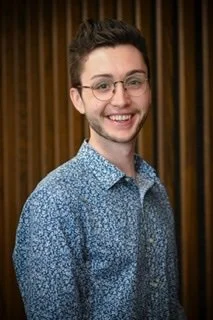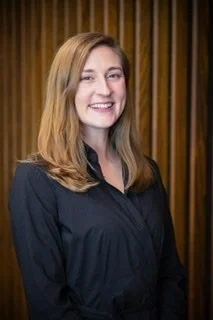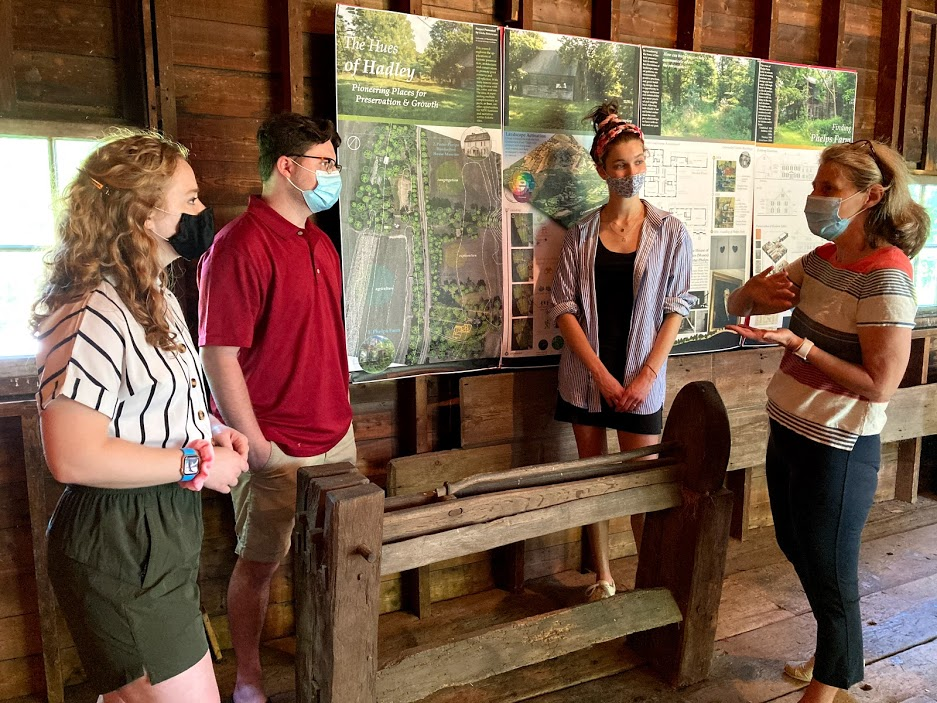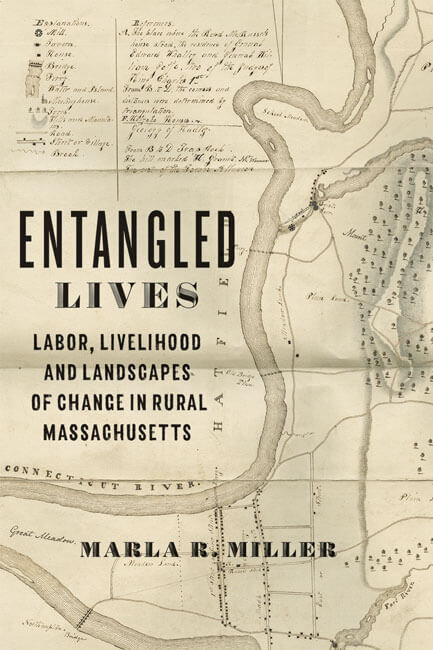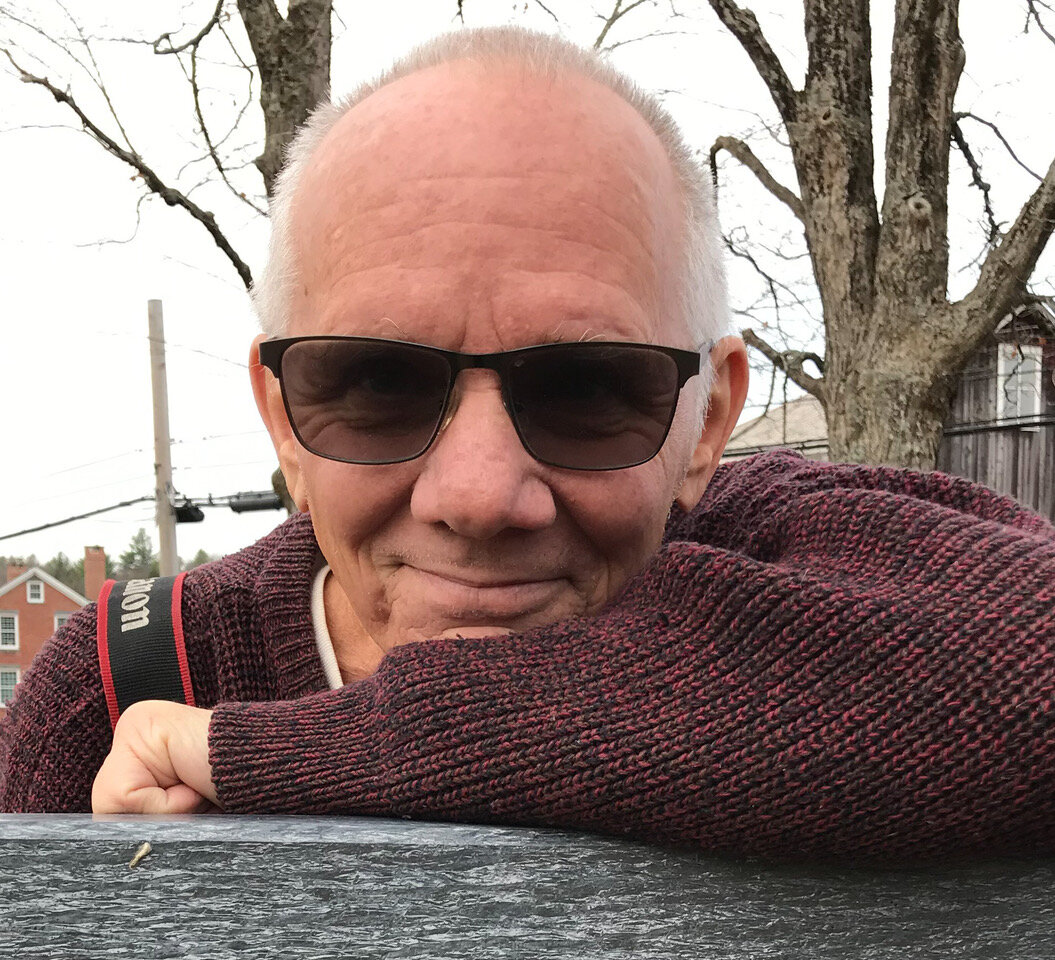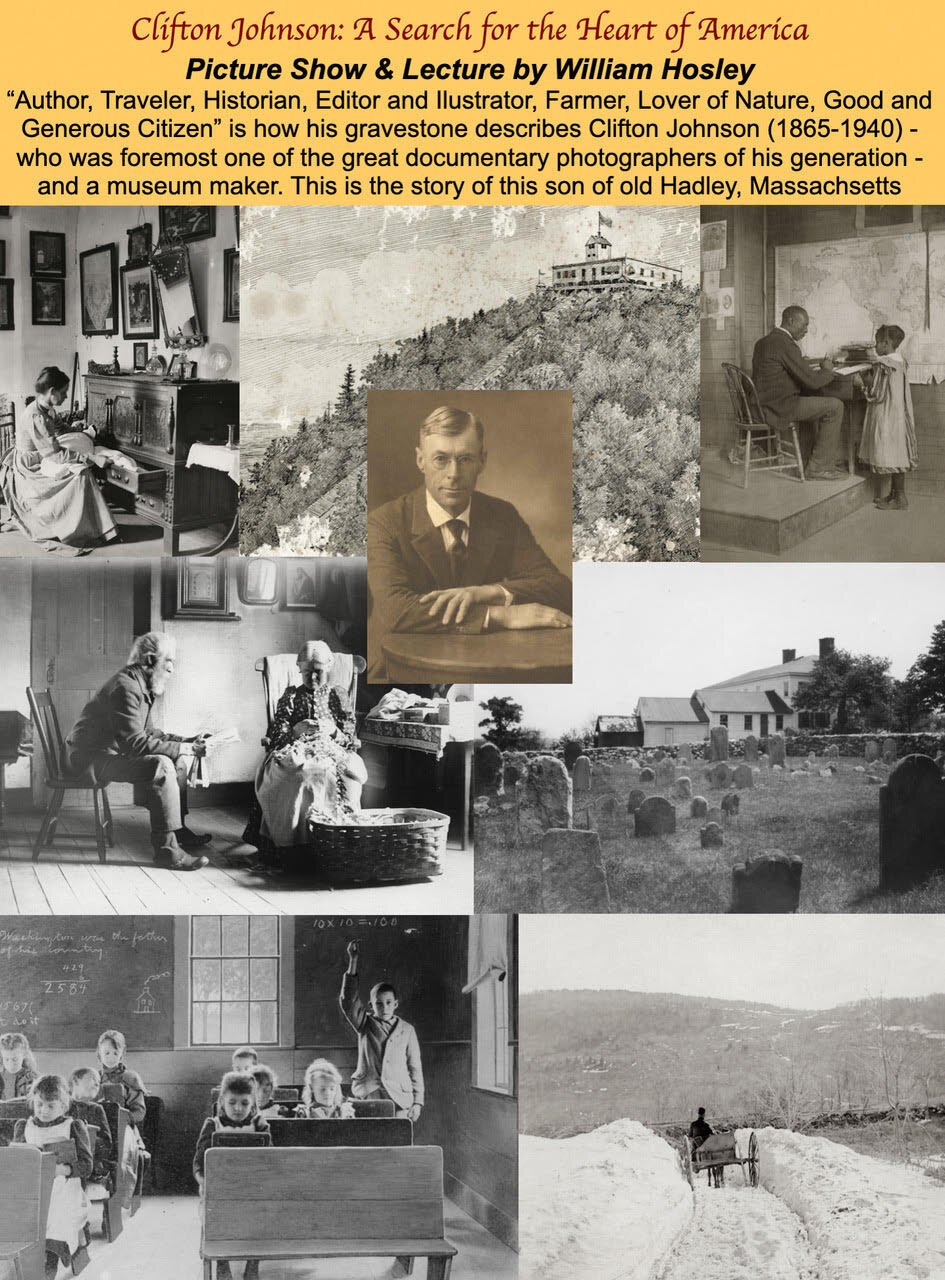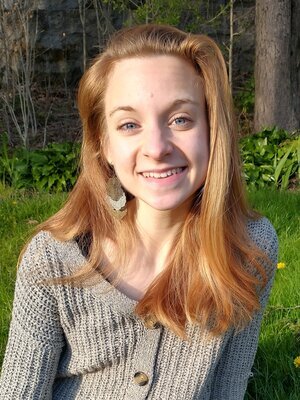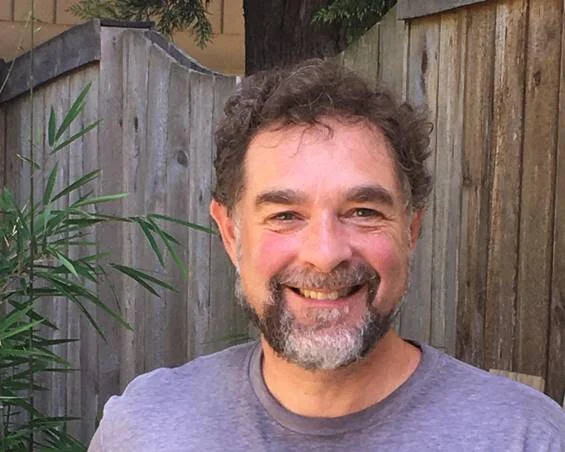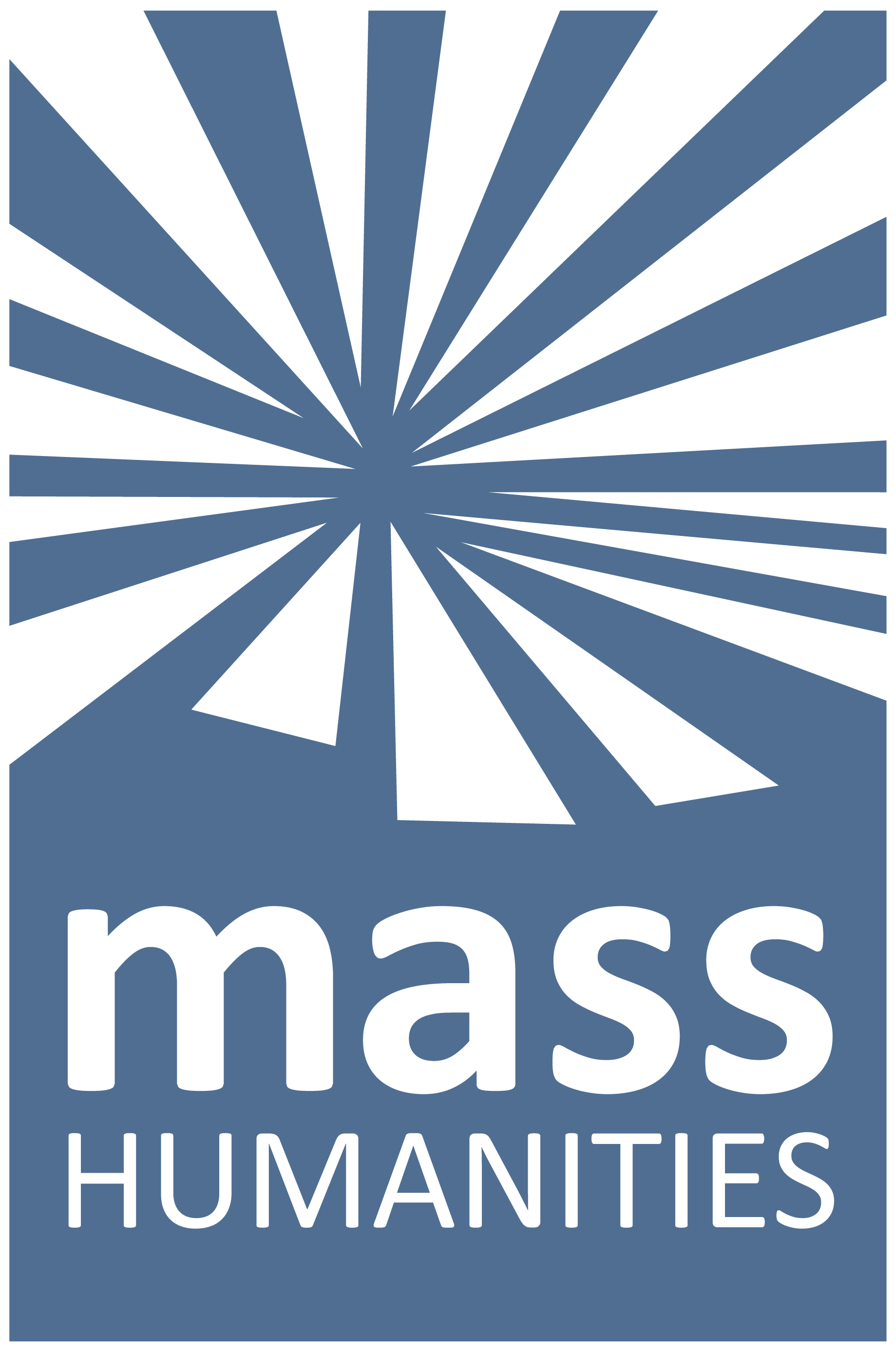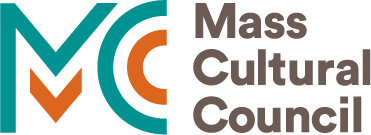Bridging the Past and Present
The Porter-Phelps-Huntington Museum presents Bridging the Past and Present, a series of virtual conversations with scholars on the history of Hadley and the Porter-Phelps-Huntington family. All of these talks are free and open to the public, made possible by a grant from the Bridge Street Fund, a special initiative of Mass Humanities to enable open access to local history.
You can watch recordings of past talks below!
“Conserving the Connecticut Valley:
Placing Preservation at Porter-Phelps-Huntington Museum"
with Brian Whetstone
July 11, 2022
Our 2022 series begins with “Conserving the Connecticut Valley: Placing Preservation at Porter-Phelps-Huntington Museum” presented by Brian Whetstone. This talk will explore the place of the Porter-Phelps-Huntington Museum in the historic preservation movement of the broader Connecticut River Valley region and examine the role of historic preservation at this site known as "Forty Acres" since its transformation into a house museum beginning in the 1920s. By exploring the unique role of historic preservation in the site's history and the Museum's role in the broader nineteenth and twentieth-century preservation movements, Whetstone will situate this historic site within larger regional, state, and national trends in historic preservation. Whetstone is a PhD candidate in History at Umass and has a BA in History and Women and Gender Studies from Hastings College. He has generated nominations to the National Register of Historic Places and is co-chair of the National Council on Public History’s New Professional and Student Committee. His research on this project was funded by a National Park Service Under-represented Communities Grant.
To watch Brian Whetsone’s talk “Conserving the Connecticut Valley: Placing Preservation at Porter-Phelps-Huntington Museum recorded on July 11, 2022 please use either of these links.
“Stories from Storage: Objects from the Porter-Phelps-Huntington Museum Collection”
with Emily Whitted
July 18, 2022
Many museums have more objects in their collection than can be on permanent display to the public, and the Porter-Phelps-Huntington Museum is no exception. But many objects within the PPH collection are embedded with fascinating material histories that complicate our present-day understandings of life in the past when closely examined. In this talk Emily Whitted will take you behind the scenes to share rarely-shown objects from the PPH collection. Whitted is a PhD student in history at UMass specializing in the material culture, labor, and skill of early American women and public history. She held a Lois F. McNeil Fellowship at the Winterthur Museum, Garden, and Library and earned an M.A. degree in American Material Culture from the University of Delaware. Her public history work includes projects with Mercer Museum & Fonthill Castle, Leverett Historical Society, and the Porter-Phelps-Huntington Museum. Her research with the Porter-Phelps-Huntington Collection was funded by a grant from the National Endowment for the Humanities.
To watch Emily Whitted’s talk “Stories from Storage: Objects from the Porter-Phelps-Huntington Museum Collection” recorded on July 18, 2022 please use either of these links:
“Come with Receipts:” Charles Porter Phelps and the Atlantic Sugar Trade
with Alison Russell
July 25, 2022
In 1807, a lucky shipment of Havana Sugar was a “god send” for Charles Porter Phelps, struggling to support his young family in Boston. After his marriage in 1799, Phelps stayed in Boston to enter the mercantile trade and try to make his fortune. He did so moving a variety of goods through the Boston port, including sugar. In the early 19th century, sugar was one of several cash crops produced through enslaved labor. Using business records and receipts, Russell will explore the extent to which sugar shipments connect the Porter-Phelps family with the Atlantic economy and the system of slavery that undergirded it. Alison Russell is a PhD student at UMass in intellectual and cultural history in the early American Republic with interests in the Constitution and the Atlantic World. She has degrees in History and Education from Boston University and an MA in Public History from American University and taught social studies in middle and high school for 10 years. Her research into Charles Porter Phelps’ receipts was funded by an “Expanding Massachusetts Stories” grant from Mass Humanities.
To watch Alison Russell’s talk : “Come with Receipts:” Charles Porter Phelps and the Atlantic Sugar Trade recorded on July 25, 2022 please use either of these links:
___________________________________________________________________________________________________________________________
Please enjoy the 2021 Bridging the Past and Present series below:
Entangled Lives:
A Conversation on Women and Work at the PPH House in the Past and Present
with Marla Miller
June 16, 2021
Kicking off the series on June 16 will be Entangled Lives: A Conversation on Women and Work at the PPH House in the Past and the Present, a conversation with Professor Marla R. Miller, author of Entangled Lives: Labor, Livelihood and Landscapes of Change in Rural Massachusetts, and Karen Sánchez-Eppler. Miller is a University of Massachusetts Professor of History and Director of the Public History Program. Professor Miller has researched early American women’s labor for nearly thirty years, producing a notable body of work including several books and more than a dozen articles. Her book Betsy Ross and the Making of America (Holt 2010)—a scholarly biography of that early American craftswoman—was a finalist for the Cundill Prize in History at McGill University, the world’s largest non-fiction historical literature prize. It was also named to the Washington Post’s “Best of 2010” list, one of the many awards and accolades Professor Miller’s extensive work has received. Her research highlights the experiences of Black, Native American, and white women in pre-industrialization Hadley, and she has recently come to study the role of “past keepers” such as authors, museum-makers, and archivists in preserving and interpreting history. Karen Sánchez-Eppler, a Professor of American Studies and English, will talk with Professor Miller about her research and methods, drawing connections with how women’s lives continue to entangle today.
Check out Marla’s “Postcards of an Imagined America” here: https://www.pphmuseum.org/marla-miller
If you missed it, we’ve embedded a recording of Marla’s talk here.
School Letters: Teaching with the Porter-Phelps-Huntington Family Papers
with Karen Sánchez-Eppler
July 7, 2021
The second talk in the series will be School Letters: Teaching with the Porter-Phelps-Huntington Family Papers, presented by Professor Karen Sánchez-Eppler on July 7. During the mid-nineteenth century as the 11 Huntington children moved away from home, for school and visits, and later for work and marriage, they wrote letters home. First year students at Amherst College have worked each fall to transcribe and annotate these letters, creating a digital archive of family relations as many of them learn to live away from home themselves. Sánchez-Eppler will share some of what this project has discovered about family life in mid-nineteenth century Hadley, and about the allure and challenges of archival work for contemporary students.
https://www.ats.amherst.edu/globalvalley/exhibits/show/pph-papers
Sánchez-Eppler is an Amherst College Professor of American Studies and English who researches nineteenth century American literature and culture. She is the author of Touching Liberty: Abolition, Feminism, and the Politics of the Body (California, 1993) and Dependent States: The Child's Part in Nineteenth-Century American Culture (Chicago, 2005), co-editor of The Oxford Handbook of Emily Dickinson (Oxford, in press) and a founding co-editor of The Journal of the History of Childhood and Youth.
Clifton Johnson: A Search for the Heart of America: Picture Show and Lecture
with William Hosley
July 28, 2021
The next talk in the series will be Clifton Johnson: A Search for the Heart of America: Picture Show and Lecture by William Hosley on July 28. “Author, Traveler, Historian, Editor and Illustrator, Farmer, Lover of Nature, Good and Generous Citizen” is how his gravestone describes Clifton Johnson (1865-1940) – who was foremost one of the great documentary photographers of his generations- and a museum maker. This talk is the story of this son of old Hadley, Massachusetts.
https://www.pphmuseum.org/clifton-johnson-photography
William Hosley is a cultural resource development consultant, historian, writer, and photographer. He was formerly Director of the New Haven Museum and Connecticut Landmarks, Curator and exhibition developer at Wadsworth Atheneum, and organized major exhibitions including The Great River: Art & Society of the Connecticut Valley (1985), The Japan Idea: Art and Life in Victorian America (1990), and Sam & Elizabeth: Legend and Legacy of Colt's Empire (1996). As an expert in heritage tourism, Hosley has studied, lectured and advised museums and heritage destinations around the country and has served as a content specialist for PBS, BBC and CPTV film documentaries.
The Porter-Phelps Huntingon Museum’s summer 2021 programs are funded, in part, by grants from the Massachusetts Cultural Council, a state Agency; the Amherst Cultural Councils, local agencies, supported by the Massachusetts Cultural Council; Mass Humanities Bridge Street Fund; Easthampton Savings Bank, Gage-Wiley & Co. and with the generous support of many local businesses and the public.
A Wind that Rose: Susan Phelps and Emily Dickinson
with Anna Plummer
August 5, 2021
The penultimate talk in the series will be A Wind that Rose: Susan Phelps and Emily Dickinson, held on August 5th. During this presentation, Anna Plummer will discuss findings from her historic and creative research paper which delves into the life of Emily Dickinson’s friend and member of the Porter-Phelps-Huntington family, Susan Davis Phelps (1827-1865). Phelps allegedly died “of a broken heart”, but her legacy in the PPH collections and local archives reveals a more nuanced story framed by the lively social scene at Amherst College and a rural 19th-century family’s struggle with loss and mental illness. Most notably, the friendship between Phelps and Dickinson brings new depth to some of the poet’s writing known around the world today.
Anna Plummer earned her B.A. in English and Theater & Dance from Amherst College in 2020 and is an emerging public history professional and creative. She is a tour guide at the Emily Dickinson Museum, most recently assisting in the development of museum virtual programming. She interned at the Porter-Phelps-Huntington Museum during the summer of 2019, where her curiosity about Susan Phelps first sparked. Here is a link to a post where you can read more on the subject: https://www.pphmuseum.org/susanphelps
If you missed it, here’s a recording of Anna’s talk!
The Province of Affliction: Illness and the Making of Early New England
with Ben Mutschler
August 18, 2021
Long before Covid, Americans wrestled with the severe disruptions that illness presented in daily life. This session turns our attention to the social and political implications of sickness in early America, featuring Ben Mutschler in conversation with Robert Gross about Mutschler’s new book, The Province of Affliction: Illness and the Making of Early New England (Chicago, 2020). Their discussion will explore the ways in which the routine presence of illness in everyday life shaped and strained the most basic institutions of eighteenth-century New England, from families and households, to neighborhoods and towns, all the way to the highest reaches of government. The early modern world suggests ready comparisons with our own -- enduring problems that were accommodated in ways both strange and familiar.
Ben Mutschler is Associate Professor of History at Oregon State University, where he teaches courses on early America. He earned his Ph.D. in history from Columbia University and has received long-term fellowships from the Omohundro Institute and the Woodrow Wilson Foundation. He is currently undertaking a new book project that explores the ways in which discussions of citizenship in the era of the American Revolution engaged questions of ability and disability. What qualities of body, mind, and temperament separated the monarchical subject from the new republican citizen?
A social and cultural historian focusing on New England in the eighteenth and nineteenth centuries, Robert A. Gross is the James L. and Shirley A. Draper Professor of Early American History Emeritus at the University of Connecticut. His first book, The Minutemen and Their World (1976) received the Bancroft Prize for 1977; it was re-issued in a 25th anniversary edition in 2001 and will appear in a new, revised edition in 2022 to mark the 250th anniversary of the American Revolution. His latest book, The Transcendentalists and Their World continues his exploration of Concord, Massachusetts, into the era of Ralph Waldo Emerson and Henry David Thoreau. It will be published by Farrar, Straus & Giroux in November 2021.
